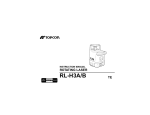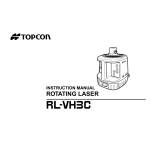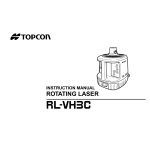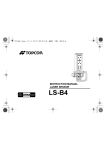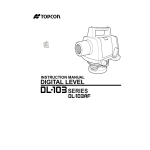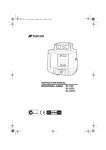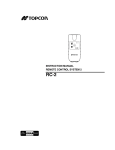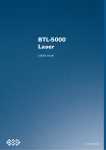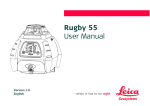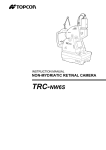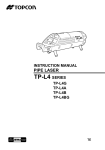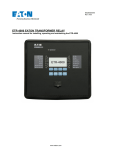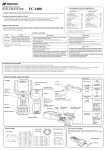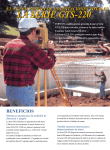Download RL-H2Sa
Transcript
RL-H2Sa X Y x100 rpm ENT ON MANU INSTRUCTION MANUAL ROTATING LASER RL-H2Sa POWER Foreword Thank you for purchasing the Topcon RL-H2Sa Rotating Laser. It is one the world’s most advanced lasers. To quickly and effectively use the RL-H2Sa, please read these brief instructions carefully, and keep them in a convenient location for future reference. Handling Precautions Before starting work or operation, be sure to check that the instrument is functioning correctly with normal performance. 1 Vibration and Impact Protection When transporting the instrument, provide protection to minimize risk of severe vibration or impact. Severe vibration or impacts may affect beam accuracy. 2 Storing the instrument for long period Remove the batteries from the instrument when you will not be using it for long period. Caution: Use of adjustment controls or performance procedures other than those specified herein may results in hazardous radiation exposure. 1 Safety Information In order to ensure the safe use of this product, prevent any danger to the operator or others, or damage to property, important warnings are placed on the product and inserted in the instruction manual. We recommend that you become familiar with the meaning of these Warnings and Cautions before continuing. Display Meaning WARNING Ignoring or disregarding of this display may lead to death or serious injury. CAUTION Ignoring or disregarding of this display may lead to personal injury or physical damage to the instrument. Injury refers to hurt, burn, electric shock, etc. Physical damage refers to damage to equipment, structure or furnishings. 2 Safety Precautions WARNING • There is a risk of fire, electric shock or physical harm if you attempt to disassemble or repair the instrument yourself. Repairs are to be carried out by TOPCON or an authorized dealer ONLY! • Laser beams can be dangerous and can cause eye injury if used incorrectly. Never attempt to repair the instrument yourself. • Laser beams can be dangerous. They can cause eye injury. Do not stare into beam or view directly with optical instruments. • Risk of fire or electric shock. Do not use a wet battery. • May ignite explosively. Never use an instrument near flammable gas or liquid matter, and do not use in a coal mine. • Battery can cause explosion or injury. Do not dispose in fire or heat. • Short circuits can cause a fire. Do not allow a battery to contact other objects when storing it. 3 CAUTION Use of controls, adjustment to the laser, or the performing of any procedures other than those specified herein may result in hazardous radiation exposure. DO NOT allow anyone to work directly in the path of the laser beam. Always make sure the laser is operating above the height of your crews heads. Exposure to laser light may cause momentary blindness. Always use caution when operating equipment near a laser. Do not allow skin or clothing to come into contact with acid from the batteries. If this occurs, wash off with copious amounts of water and seek medical attention. Damaged or broken carrying cases may fall open causing injury, or damage to the laser. Do not use a carrying case with damaged belts, grips or latches. It could be dangerous if the instrument falls off of its mount. Please check that you have mounted the instrument to the wall mount or tripod securely and correctly. An unstable tripod can pose a potential risk of injury or damage to the laser. Always check that screws or leg locks are tight and tripod is sitting firmly. Please note that the tips of tripod can be hazardous and be aware of this when setting up or carrying the tripod. 4 User Precautions 1 Always wear protective clothing (safety shoes, helmet, etc.) when operating. Exceptions from Responsibility 1 The user of this product is expected to follow all operating instructions and make periodic checks of the product’s performance. 2 The manufacturer, or its representatives, assumes no responsibility for results of a faulty or intentional usage or misuse including any direct, indirect, consequential damage, and loss of profits. 3 The manufacturer, or its representatives, assumes no responsibility for consequential damage, and loss of profits by any disaster, (an earthquake, storms, floods etc.), fire, accident, or an act of a third party and/or a usage in other than usual conditions. 4 The manufacturer, or its representatives, assumes no responsibility for any damage, and loss of profits due to a change of data, loss of data, an interruption of business etc., caused by using the product or an unusable product. 5 The manufacturer, or its representatives, assumes no responsibility for any damage, and loss of profits caused by usage other than explained in the user manual. 6 The manufacturer, or its representatives, assumes no responsibility for damage caused by wrong movement, or action due to connecting with other products. 5 Laser Safety This product uses a invisible laser beam, and is manufactured and sold in accordance with “Performance Standards for Light-Emitting Products” (FDA/BRH 21 CFR 1040) or “Radiation Safety of Laser Products, Equipment Classification, Requirements and User’s Guide” (IEC Publication 825) provided on the safety standards for laser products. As per the said standard, this product is classified as a “Class 3A (IIIA) Laser Product”. This is a simple product to operate and does not require training from a laser safety officer. In case of any failure, do not disassemble the instrument. Contact TOPCON or your TOPCON dealer. Labels AVOID EXPOSURE LASER LIGHT IS EMITTED FROM THIS APERTURE DANGER LASER RADIATION Beam aperture AVOID DIRECT EYE EXPOSURE WAVE LENGTH 685nm 5mW MAXIMUM OUTPUT RL-H2Sa X Y CLASS a LASER PRODUCT x100 rpm ENT ON MANU POWE R LASER RADIATION DO NOT STARE INTO BEAM Maximum output 5mW Wave length 685nm CLASS 3A LASER PRODUCT Labels are differed by the market. 6 Contents Foreword ............................................1 Handling Precautions ................................... 1 Safety Information ........................................ 2 Safety Precautions ....................................... 3 User Precautions ......................................... 5 Exceptions from Responsibility .................... 5 Laser Safety ................................................. 6 Contents ...................................................... 7 Standard System Components .................... 8 Nomenclature and Functions ...........9 RL-H2Sa ...................................................... 9 Control Panel ............................................ 10 Basic Operation .................................11 Preparation and Functions ...............12 Battery Installation ....................................... 12 Instrument Set-up Procedure ....................... 12 Battery Warning Indicator ............................ 13 Auto-leveling lamp ....................................... 14 To turn automatic leveling off .................... 14 Inclination Warning ...................................... 15 Changing rotation speed ............................. 16 Height Alert function .................................... 16 To activate the height alert function .......... 16 Aligning Direction of Grade .......................... 17 Entering Grade ............................................ 18 How to enter grade ................................... 19 Masking (Laser beam shutter) .................... 21 Maintaining Power Sources ............. 22 Installing ...................................................... 22 Charging ...................................................... 22 Checking and Adjusting Calibration 24 Horizontal Calibration .................................. 24 (1) Checking Calibration ........................... 24 (2) Adjusting Calibration ........................... 26 Horizontal Rotation Cone Error ................... 31 Grade Setting Error ..................................... 32 (1) Checking ............................................. 32 Storage Precautions ......................... 35 Standard / Optional Accessories ..... 36 Laser sensor holder model 5 .................... 36 Laser sensor holder model 3 .................... 36 LS-70A Laser Sensor ............................... 37 LS-70B Laser Sensor ............................... 37 Scope Model 3 .......................................... 40 Rechargeable battery holder DB-51 ......... 41 Error Code .......................................... 42 Specifications .................................... 43 RL-H2Sa ..................................................... 43 Laser Sensor LS-70A/B .............................. 44 7 Standard System Components 1 2 3 4 5 6 7 8 RL-H2Sa ....................................................................................... 1pc. BT-51Q (Ni-MH) Rechargeable battery ................................................. 1pc. DB-51C Rechargeable battery holder ................................................... 1pc. AD-9B/7C AC/DC converter ................................................................. 1pc. LS-70B Laser Sensor ........................................................................... 1pc. Laser Sensor holder, model 3 ............................................................... 1pc. Carrying case ....................................................................................... 1pc. Instruction manual................................................................................. 1vol. Please make sure that all of the above items are in the box when you unpack. 8 Nomenclature and Functions RL-H2Sa Grade alignment sights Rotary head Beam aperture Handle Control Panel RL-H2Sa X Y x100 rpm ENT ON MANU POWE R Battery holder Battery compartment lock 9 Control Panel Masking direction indicator Rotation speed X-axis key X-axis grade display Y-axis key (Arrow key for Mask quadrant 4) Y-axis grade display Rotation control key (Arrow key for Mask quadrant 2) Auto leveling indicator Battery indicator Arrow keys Enter key • • • Changes rotation speed Changes grade setting Controls mask quadrants 1 and 3 Manual mode lamp Power key Auto/manual leveling key 10 Mask key Basic Operation 1 Set the RL-H2Sa on a tripod or flat surface. (See "Instrument Set-up Procedure " on page 12.) 2 Turn the instrument ON and enter a grade if X % 100 × rpm ENT ON POWER MANU desired. (See "Entering Grade " on page 18.) 3 Set beam rotation to the desired speed. (See "Changing rotation speed " on page 16.) 4 Set the electronic beam shutter (mask) for specific quadrants if desired. (See "Masking (Laser beam shutter) " on page 21.) 5 Turn on LS-70 laser sensor. If high-precision detection is desired, select that setting on the LS-70.( See "Standard / Optional Accessories " on page 36 for more information.) 6 Use the LS-70 to intercept the rotating laser beam to check a specific elevation. 11 Preparation and Functions Battery Installation For battery installation instructions, see "Maintaining Power Sources " on page 22. Instrument Set-up Procedure 1 Set the instrument on any smooth surface that is within ±5° of true level. The RL-H2Sa auto-level system will not function if the unit is placed more that 5° out of level. For best operation, it is recommended that it be mounted to a tripod. Beam slope can be set in the X-axis (See "Entering Grade " on page 18.) Horizontal Leveling range 12 Battery Warning Indicator The Battery warning indicator indicates the battery power remaining. Battery is sufficient. The power is low, but laser is still usable. In this state, the laser will transmit the battery warning signal to laser sensor. AC/DC converter AD-9B or AD-7C is available for continuing the operation. Blinking Note Dead batteries. The rotary head stops and no beam is emitted from the laser. Recharge the battery (BT-51Q Ni-MH rechargeable battery) or replace the dry batteries with new ones. (The laser will shut down a few minutes after the blinking indicator comes on.) AC/DC converter AD-9B or AD-7C is available but it is necessary to turn OFF the instrument once, and turn ON the instrument again. • When BT-51Q (Ni-MH rechargeable battery) is used, the blinking period will be shorter because of the characteristic of the battery. • The LS-70A and LS-70B laser sensors can detect and signal low power state of laser. 13 Auto-leveling lamp Flashing : Auto-leveling is in process. When automatic leveling is almost complete, the flashing rate will be slow. The head will not rotate and the laser beam will not emit during the auto-leveling process. ON Solid:Auto-leveling is complete. The rotary head is active and emits the laser beam. To turn automatic leveling off To turn OFF the auto-leveling function (manual mode), press the Auto/Manual leveling control pad twice in quick succession. The manual mode indicator light will illuminate. The instrument can be positioned in any direction and the laser beam remains on and the head will rotate. IMPORTANT: In manual mode, the laser beam will not shut off if disturbed! To return to Autoleveling mode, press Auto/Manual control pad once. 14 Inclination Warning If the instrument is inclined out of automatic grading range (usually approximately ±5°, but ±2° according to the set grades). The Auto-leveling lamp will flash and the grades will disappear. Set the instrument as horizontally as possible and turn off/on the instrument again. (This warning may be displayed about six minutes or more after powering ON.) . % X 100 × rpm ENT ON POWER MANU Blinking 15 Changing rotation speed Press Rotation Control key to activate rotation speed mode. Select the rotation speed 300 r.p.m, 600 r.p.m or 900 r.p.m by pressing the arrow keys. Press the Enter key to accept the setting. Height Alert function When auto-leveling and height alert function are active, this function prevents the instrument from operating if it is disturbed. This insures accurate control. If the unit is disturbed, all displays and Auto-leveling lamp will flash. The elevation (height of instrument) should be verified and re-established if necessary. Note • The LS-70A and LS-70B laser sensors can detect and signal the height alert warning. To activate the height alert function To activate the height alert function, depress and hold the Manual key [MANU] while turning on the instrument by pressing the Power key. The display will show “HiON” for two seconds before starting auto-leveling. Height alert function will be turned ON automatically after 10 minutes since the auto-leveling is completed. Turn the power key OFF and ON again, the height alert function will be de-active again. 16 Aligning Direction of Grade When using the laser with a percent of grade entered, the laser must be properly aligned so the slope of the laser beam is parallel to the desired direction of grade. The sighting collimator on top of the instrument is calibrated to the grade axis of the laser beam. Follow the steps below to align the laser to the desired direction of grade: 1 Establish a target line parallel to desired direction of grade. 2 Set up the laser over this line (drop a plumb bob from the tripod mounting screw). 3 Rough align the instrument to the direction of grade. Make sure it is properly oriented for the grade to be entered, positive or negative. (See page 18) 4 Place a rod or other target down range on the target line. 5 While sighting through the collimator, adjust the instrument until the sight is aligned with the target. (see right) Target Plus direction Minus direction 17 Entering Grade The laser beam can be sloped in either the X or Y axis (single slope) or both axes (compound slope). Grade range: Single axis: -8.000 to +8.000%, Dual axes: |X| + |Y| ≤ 10.000% Compound slope Single Axis Dual Axes Plus (+) +8% - 8% Minus (-) Minus (-) - 8% +8% Y % X axis Plus (+) 100 × rpm ENT ON POWER MANU Plus (+) +8% - 8% - 8% Minus (-) 18 +8% Y axis X axis Horizontal X % Control Panel side Minus (-) Y axis Horizontal Plus (+) How to enter grade Setting example: Grade toward X-axis -2.800%, Y-axis -3.456% Operating procedure Operation Display 1 Turn the instrument on by pressing the power con- Power ON trol pad. Auto-leveling will start. 2 Press the [ X] key to activate grade entry. The position of the second figure to the left of the decimal point will blink. 3 Press the [▲] or [▼] key to set "-" (negative grade). 4 Press the [X] key to activate the first figure to the left of the decimal point. 5 Press the [▲] key twice to set ‘2’. 6 Press the [X] key to activate the first figure to the [X] [▲]or[▼] [X] [▲]twice [X] right of the decimal point. 7 Press the [▼] key twice to set ‘8’. 8 Press the [ENT] key to accept the X-axis grade. [▼]twice [ENT] 19 9 Press the [ Y] key to to activate grade entry. [Y] The position of the second figure to the left of the decimal point will blink. 10 Press the [Y] key to activate the first figure to the left of the decimal point. 11 Press the [▲] key three times to set ‘3’. 12 Input the next figures in the same manner. 13 Press the [ENT] key to accept the Y-axis grade. [Y] [▲] 3times [ENT] • Grade range: Single axis, -8.000% to +8.000%; Dual axes, |X| + |Y| ≤ 10.000% grade. • After grade entry is completed, it will take about two minutes for the beam to reset and rotation to begin. DO NOT touch or tilt the instrument during automatic leveling as it will disturb the precision of the leveling. 20 Masking (Laser beam shutter) The RL-H2Sa features electronic beam “masking” to prevent the beam from transmitting on one or multiple sides of the instrument. This can be useful to eliminate duplicate laser beams on job sites where more than one laser may be in use. The beam plane is divided into four masking quadrants as indicated on the masking display. The direction of the four masking quadrants can be set as shown below. 1 Press the Mask key. Mask display 2 To change the masking direction mode, press the and Direction Mask display Operation keys Mask key again. Each press toggles between the two masking direction modes. 3 To mask a specific quadrant, press the arrow key that corresponds to that quadrant. Each press toggles between activating and releasing the mask for that quadrant. 4 To mask additional quadrants, repeat step 3 with the arrow key for that quadrant. 5 Press the Enter key to accept the masking settings. 21 Maintaining Power Sources Installing 1 Insert the BT-51Q rechargeable battery into the instrument. 2 Place the DB-51C rechargeable battery holder firmly into the instrument and turn the battery cover knob to “LOCK”. Charging 1 Plug the AC/DC converter (AD-9B or AD-7C) into the charger jack on the DB-51C rechargeable battery holder. 2 Plug the convertor cord into a proper power outlet (AD-9B is for AC120V, AD-7C is for AC230V) 3 Complete charging by unplugging the converter con- RL-H2Sa X nector from the DB-51C rechargeable battery holder after approximately 9 hours. Y x100 rpm ENT ON MANU POWE R 4 Unplug the converter from the outlet. DB-51C The DB-51C LED will indicate charging status as follows: Red ON : Charging AC/DC converter AD-9B/7C Green ON : Charging completed Green flashing : DB-51C is not connected to BT-51Q rechargeable battery. 22 Red flashing : BT-51Q protection feature is working automatically. RL-H2Sa can be used in this state. Automatic protection feature; In case of overcharge or high or low temperature state exceeding charging range, charging will be stopped or changed to protect battery. Note 1) The RL-H2Sa can be charged while using the laser. 2) Alkaline batteries can be used with the DB-51C rechargeable battery holder. 3) Recharging should take place in a room with an ambient temperature range of 10°C to 40°C (50°F to 104°F). 4) The battery source will discharge when stored and should be checked before using with instrument . 5) Be sure to charge stored battery source every 3 or 4 months and store in a place at 30°C (60°F) or below. If you allow the battery to be completely discharged, it will have an effect on future charging. 6) Recharging of the BT-51Q may sometimes take less than 9 hours because of its remaining capacity at time of charging. 23 Checking and Adjusting Calibration There are three areas of performance the user should check periodically. Horizontal Calibration Horizontal Rotation Cone Grade Setting Error The Horizontal Calibration can be easily checked and, in most cases, adjustments can be made by the user. Horizontal Rotation Cone and Grade Setting Error can be checked by the user. However, if an error is found, adjustments must be made by a Topcon service facility. Horizontal Calibration (1) Checking Calibration Instrument as seen from above Laser Beam at X1 Level Sensor 1st On-Grade Position Panel side X % Y % 100 × rpm ENT ON POWER MANU Wall 50m (160feet) Handle 1 Set up a tripod 50m (160ft) from a wall. Mount the instrument on the tripod, facing the X1 side toward the wall. 24 2 Turn the unit on and allow auto-leveling to complete. Confirm that the grade is set to 00.000%. 3 Put the laser sensor in fine detection mode by pressing X % Y % 100 × rpm ENT ON POWER MANU the mode switch.(See page 37.) 4 Position the sensor so that it “finds” the rotating laser beam and signals “on-grade” by displaying a horizontal bar and emitting a continuous beep. 5 Mark the “on-grade” position and turn off the instrument. 6 Loosen the tripod screw, rotate the instrument 180 degrees and re-secure it on the tripod. Note • When rotating the instrument, avoid knocking it off level or changing height. 7 Turn the unit on again and allow auto-leveling to complete. Confirm the grade is set to 00.000%. 1st On-Grade Position (X1) X1 laser beam 8 Position the sensor so that it “finds” the rotating laser beam and signals “on-grade”. 9 Mark the on-grade position (X2). 10 Measure the distance between the X2 laser beam If less than 5mm( 0.2 inches) No calibration Necessary 2nd On-Grade Position (X2) 50m (160feet) first mark (X1) and your second 25 mark (X2). No calibration is necessary if distance is within 5mm (0.2 inches). If the distance is greater than 5mm (0.2 inches), adjust as follows. 11 Repeat procedure for the Y axis. Note • Please contact your Topcon dealer if the distance between the first and second mark exceeds ±40mm (1.6 inches). (2) Adjusting Calibration To calibrate the X axis: 1 Press the Power button once to turn off the laser. Turn the laser back on by pressing the Power button down while pressing the X AXIS button. This activates the X axis calibration mode. Confirm that rotation speed is set to 1. Press and Hold Press 2 After the “CAL” display changes to “POS 1”, move the level sensor up or down until it “finds” the rotating laser beam and signals “on-grade”. 26 Note • When the instrument has auto-leveled, the “POS 1” will stop flashing. 3 When the sensor signals “on-grade”, secure its position. Move Level Sensor Up or Down Until Beam is Detected. X % Y % 100 × rpm ENT ON X % Y % 100 × rpm ENT ON When Beam is Detected, Fix Level Sensor. POWER MANU POWER MANU 50m (160 feet) 50m (160 feet) 4 Press the ENT key. The display will change to “POS 2”. PRESS ENTER 27 5 When “POS 2” is displayed, rotate the instrument 180 degrees; the instrument will selflevel. When the instrument has auto-leveled, the “POS 2” will stop flashing. Note • When rotating the instrument, avoid knocking it off level or changing height. PRESS ▲ OR ▼ BUTTON TO MOVE BEAM 6 Adjust the laser beam to the sensor so that an “on-grade” signals is displayed. To adjust the position of the laser beam, press the up or down arrows on the panel. X1 laser beam X2 laser beam 50m (160feet) 28 Align Beam to Fixed Laser Sensor "On-grade signal means X2 beam has been adjusted to same elevation as X1 beam. 50m (160feet) 7 When a continuous "on-grade" signal is achieved, press the ENT key. “CALC” will appear in the display. Keep the instrument as it is until an error correction value appears. (If the instrument was disturbed during the calculation, you will need to re-start the adjustment process.) After a short time, “CAL END” will appear. PRESS ENTER Note • If the error is greater than the self-correction range, “E72” error code will display and LEDs will blink alternately. Contact your Topcon dealer. 29 8 Turn Off the instrument by pressing the Power key. 9 Turn the power ON again and follow the checking procedure again to confirm that proper calibration has been completed. 10 Repeat the checking and, if necessary, the adjusting procedure for the Y-axis. 11 If the Y-axis requires adjustment, begin at Step 1 on page 26. However, when turning on the instrument in calibration mode, press and hold the Y AXIS button while pressing the Power key. This activates the Y-axis calibration mode. For Y-axis calibration Press and Hold Press 30 Horizontal Rotation Cone Error Perform the following check after completing "Horizontal Calibration" on the previous pages. Minimum about 40m/131ft Cone error X % 100 × rpm ENT ON MANU Wall A 1 2 3 4 5 6 POWER X % Datum position 100 × rpm ENT ON POWER MANU Wall B Wall A Wall B Set up the laser centered between two walls approximately 40m (131ft) apart. Orient the instrument so one axis, either X or Y, is facing the walls. Confirm grade is set to 00.000%. Locate and mark the position of the rotating laser beam on both walls using the laser sensor. Turn off the instrument and move the instrument closer to wall A (1m to 2m /3 ft to 6 ft). Do not change the axis orientation of the instrument. Turn the instrument on. Again locate and mark the position of the rotating laser beam on both walls using the laser sensor. Measure the distance between the first and second marks on each wall. If the difference between each set of marks is less than 4mm (5/32 of an inch), no error exists. Note • If the error is greater than 4mm ( 5/32 of an inch), contact your Topcon dealer. 31 Grade Setting Error Perform the following check only after completing "Horizontal Calibration" and “Horizontal Rotation Cone Error” procedures. (1) Checking • Due to the accuracy required to perform this check, the rod used in this proNote cedure must be graduated in millimeters. 1 Securely position two nails or stakes exactly 30m (93 ft) apart. These positions will be called Nail 1 and Nail 2. Laser Sensor Rod Rod X % 100 × rpm ENT ON POWER MANU Nail 1 Nail 2 2 Set up the instrument on a tripod approximately 1m to 2m (3 ft to 6 ft) in front of Nail 1 on the line created by Nail 1 and Nail 2. Position the instrument so the X-axis is exactly aligned to the line created by Nail 1 and Nail 2. 3 Turn on the instrument and verify the grade setting is 00.000%. Turn on the LS-70 laser sensor and set it to high precision detection. Using the rod, read the elevation of the laser 32 beam in millimeters at Nail 1 and Nail 2. Designate the elevation at Nail 1 as “h1”, at Nail 2 as “h2”. 4 Set X-axis grade to 1.000%. Again, read the elevation of the laser beam in millimeters at Nail 1 and Nail 2. Designate these elevations as “h3” at Nail 1, and “h4” at Nail 2. X % 100 × rpm ENT ON POWER MANU Nail 1 Nail 2 5 Using the millimeter elevation readings for h1, h2, h3 and h4, and converting the 30mm distance between Nail 1 and Nail 2 to 30000mm, complete the equation below. x(%)= (h2-h4) - (h1-h3) ✕ 100 30000 (mm) If the calculated result is the range of 0.990% - 1.010%, the instrument is within specifications. 33 Note • If the calculated result is out of the range, contact your dealer or Topcon. Example; h1 = 1370; h2 = 1390; h3 = 1362; h4 = 1080 x(%)= (1390-1080)-(1370-1362) x 100 30000 x(%)= 310 - 8 30000 x 100 x(%)= 0.010066 x 100 x(%)= 1.006% The X axis of instrument is normal because 1.006 is within the range 0.990 to 1.010. 34 Storage Precautions Always clean the instrument after use. Use a clean cloth, moistened with a neutral detergent or water. Never use an abrasive cleaner, ether, thinner benzene, or other solvents. Always make sure instrument is completely dry before storing. Dry any moisture with a soft, clean cloth. 35 Standard / Optional Accessories Laser sensor holder model 3 Laser sensor holder model 5 160 160 159 159 158 158 157 157 156 156 155 155 154 154 153 153 152 151 150 152 Clamp knob 149 151 Clamp knob 150 148 147 143 POWER 142 139 131 139 138 137 136 135 138 Laser sensor holder model 3 Laser sensor holder model 5 137 136 135 134 134 133 132 133 132 131 Laser sensor 130 129 128 127 126 125 131 Laser sensor 130 129 128 127 126 125 Holder Model 5 allows the laser sensor to be moved up or down on the rod by squeezing the spring-loaded clamp on its back side without removing the sensor from the rod. 36 LS-70B Laser Sensor LS-70A Laser Sensor Beam receiving window Beam receiving window Indicator Indicator On-Grade index Buzzer sound switch (Quite/Loud/OFF) On-Grade index On-Grade index On-Grade precision switch Two on-grade precision options are available, normal precision and high precision. By pressing this switch, the precision options are switched alternately. Confirm the precision choice by the indicator. (Normal precision is the default setting each time the sensor is turned on.) Power switch Buzzer speaker Illumination switch Power switch Buzzer speaker Buzzer sound switch (Quite/Loud/OFF) Auto-cut off function (LS-70A and LS-70B) The power will be turned off automatically if no laser beam is detected within approximately 30 minutes. (To turn the sensor on again, press the power switch.) 37 Display (LS-70A/70B) High precision mode RL-H2Sa Height Alert warning * The sensor will signal if the laser has been disturbed so the height of the instrument can be checked. The buzzer will sound for about five seconds and the height alert warning symbol will flash until the sensor detects normal beam rotation from the laser. To obtain normal beam rotation, the RL-H2Sa must be turned off then back on. Then check that beam height has not changed (See page 16). RL-H2Sa Battery warning * The sensor will signal if the battery of the RL-H2Sa is low. The laser low battery warning symbol will flash on the LS-70 display. No audio signal is generated for this warning. *Warning detection at the LS-70 can be canceled by turning off the LS-70, then turning it back on while pressing the buzzer sound switch. Normal precision mode Above grade indicator Move the sensor down, The arrow will become shorter as the on-grade position is approached (see next page for specific information). Audio signal: High- pitch, frequent beep. On-Grade indicator (Audio signal: Continuous beep sound) Below grade indicator Move the sensor up, The arrow will become shorter as the on-grade position is approached (see next page for specific information). Audio signal: Lower- pitch, slower frequency. Sensor battery indicator Indicates the battery status of LS-70A/70B as follows. Battery is sufficient. The power is low, but sensor is still usable. Flashing alternately Dead battery. Replace the 9v alkaline battery as instructed on next page. 38 Detective range (LS-70A/70B) HIGH Replacing Battery (LS-70A/70B) NORMAL LS-70A ±2mm/±.0064mm ±1mm/±.0032ft (4mm/.013 ft width) (2mm/.0064ft width) LS-70B ±1mm/±.0032ft (2mm/.0064ft width) ±5mm/±.016ft (10mm/.032ft width) ±10mm/±.033ft (20mm/.066ft width) ±15mm/±.05ft (30mm/.10ft width) More than ±15mm/±.05ft 1 Press the lid in the direction of the arrow to lift. 2 Remove the battery and replace with a new 9v alkaline battery. 3 Press the lid down and click to close. Remote display with coil cord (LS-70A option only) Optional remote display connects to the back of the LS-70A. The remote LCD display can be positioned up to 5m (16 ft) from the laser sensor. Connector Coil cord Remote display Laser sensor has been moved above or below the laser beam. Move sensor in direction of arrow to receive laser. 39 Scope Model 3 The optional scope replaces the sighting collimator (see page 17) on top of the instrument and provides greater accuracy in aligning the laser to the direction of grade. The scope can be swiveled and locked in place so its aimed toward any of the four beam axes. Using the scope, follow the steps on page 17 to align the instrument. 40 Dry battery holder DB-51 How to replace dry batteries 1 Remove the battery holder DB-51 by turning the battery compartment lock to “OPEN”. 2 Remove the old batteries and replace with four (4) new “D” cell alkaline batteries making sure each is placed in the proper direction as indicated. 3 Replace the battery holder (DB-51) and turn the knob to Battery lock knob “Lock”. DB-51 Note • Replace all 4 batteries with new ones. • Do not mix used and new batteries, and do not mix different types of batteries together. • Insert batteries with the positive (+) and negative (-) terminals oriented correctly. 41 Error Code Error code Description E30, 31 Abnormal operation of tilting system detected. E62 E72 E99 Countermeasures Turn the instrument OFF and ON again. Abnormal operation of internal vertical Turn the instrument OFF and ON angle detecting system has occurred. again. Calibration error is greater than selfcorrection range. Turn the instrument OFF and ON again and perform the calibration again. Abnormal operation of internal memory system detected. Turn the instrument OFF and ON again. If errors still persist after attempting to clear them, contact your dealer or Topcon. 42 Specifications RL-H2Sa Auto-leveling range : ±5° Beam detecting range : 2m–700m diameter (6ft–2,300ft) Laser source : Laser diode (visible) Laser class : Class 3A laser product Rotation speeds : Selectable : 300, 600, 900 r.p.m. Grade setting range : Single axis : -8.000% to +8.000% Dual axes : |X| + |Y| ≤ 10.000% Power supply : 4 D-cell batteries (DC6 V), Rechargeable battery BT-51Q (When using with LS-70A/70B) Continuous operating time (+20°C) Alkaline (dry) batteries : Approx. 45 hours Rechargeable battery BT-51Q : Approx. 30 hours Tripod screw : Flat and dome head type, 5”/8 × 11threads Operating temperature : -20°C to +50°C (-4°F to +122°F) Dimensions : 169 (L) × 169(W) × 250(H) mm [ 6.7(L) × 6.7 (W) × 9.8(H) in] Weight : 2.7 kg [6 lbs] (with four dry batteries) 43 Laser Sensor LS-70A/B Beam detection window : 50mm (2.0 in) Beam detection precision : High precision:±1mm(±0.04 in) Normal precision:±2mm(±0.08 in) Beam detection indication : Liquid crystal and buzzer Power source : DC 9V alkaline (dry) battery Auto shut-off delay : Approx. 30 minutes without beam detection. Operating temperature : -20°C to +50°C (-4°F to +122°F) Continuous operating time at +20°C (68°F) Alkaline manganese dry batteries : Approx. 80 hours LS-70A : 167(l) × 78(w) × 27(h) mm [ 6.6(L) × 3.1 (W) × 1.1(H) in] LS-70B : 165(l) × 78(w) × 26(h) mm [ 6.5(L) × 3.1 (W) × 1.0(H) in] Weight : 0.25 kg [0.55 lbs] (with dry batteries) Remote display : Optional for LS-70A only Dimensions 44 TOPCON AMERICA CORPORATION CORPORATE OFFICE 37 West Century Road, Paramus, New Jersey 07652, U.S.A. Phone: 201-261-9450 Fax: 201-387-2710 www.Topcon.com TOPCON CALIFORNIA 3380 Industrial BLVD, Suite 105, West Sacramento, CA 95691, U.S.A. Phone: 916-374-8575 Fax: 916-374-8329 TOPCON MIDWEST 891 Busse Road, Elk Grove Village, IL 60007, U.S.A. Phone: 847-734-1700 Fax: 847-734-1712 TOPCON LASER SYSTEMS, INC. 5758 West Las Positas Blvd., Pleasanton, CA 94588, U.S.A. Phone: 925-460-1300 Fax: 925-460-1315 www.topconlaser.com TOPCON EUROPE B.V. Esse Baan 11, 2908 LJ Capelle a/d IJssel, The Netherlands. Phone: 010-4585077 Fax: 010-4585045 www.topconeurope.com TOPCON BELGIUM Preenakker 8, 1785 Merchtem, Belgium Phone: 052-37.45.48 Fax: 052-37.45.79 TOPCON DEUTSCHLAND G.m.b.H. Halskestr. 7, 47877 Willich, Germany. Phone: 02154-9290 Fax: 02154-929-111 Telex: 8531981 TOPC D TOPCON S.A.R.L. 89, rue de Paris 92585 Clichy, Cedex France. Phone: 01-4106 9494 (MEDICAL) 1-4106 9490 (TOPOGRAPHIE) Fax: 01-47390251 TOPCON (GREAT BRITAIN) LTD. HEAD OFFICE Topcon House Kennet Side, Bone Lane Newbury Berkshire RG14 5PX U.K. Phone: 001-44-1635-551120 Fax: 001-44-1635-551170 TOPCON SINGAPORE PTE. LTD. Blk 192 Pandan Loop, Pantech Industrial Complex #07-01 Singapore 128381 Phone: 2780222 Fax: 2733540 E-mail: [email protected] TOPCON AUSTRALIA PTY. LTD. 408 Victoria Road, Gladesville, NSW 2111, Australia Phone: 02-9817-4666 Fax: 02-9817-4654 TOPCON INSTRUMENTS (THAILAND) CO., LTD. 77/162 Sinn Sathorn Tower, 37th Fl., Krungdhonburi Rd., Klonglonsai, Klongsarn, Bangkok 10600 Thailand. Phone: 662-440-1152~7 Fax: 662-440-1158 TOPCON INSTRUMENTS (MALAYSIA) SDN. BHD. Lot 226 Jalan Negara 2, Pusat Bandar Taman Melawati, Taman Melawati, 53100, Kuala Lumpur, Malaysia. Phone: 03-4079801 Fax: 03-4079796 TOPCON KOREA CORPORATION Hyobong Bldg., 1-1306, Seocho-Dong, Seocho-Gu, Seoul, Korea. Phone: 02-3482-9231 Fax: 02-3481-1928 TOPCON OPTICAL (H.K.) LIMITED 2/F., Meeco Industrial Bldg., No. 53-55 Au Pui Wan Street, Fo Tan Road, Shatin, N.T., Hong Kong Phone: 2690-1328 Fax: 2690-2221 E-mail: [email protected] TOPCON CORPORATION BEIJING OFFICE Room No. 962 Poly Plaza Building, 14 Dongzhimen Nandajie, Dongcheng District, Beijing, 100027, China TOPCON ESPAÑA S.A. Phone: 10-6501-4191~2 Fax: 10-6501-4190 HEAD OFFICE TOPCON CORPORATION BEIRUT OFFICE Frederic Mompou 5, ED. EUR03 08960, Sant Just Desvern BarceP. O. BOX 70-1002 Antelias, BEIRUT-LEBANON. lona, Spain. Phone: 961-4-523525/961-4-523526 Fax: 961-4-521119 Phone: 93-473-4057 Fax: 93-473-3932 TOPCON CORPORATION DUBAI OFFICE MADRID OFFICE Offce No. 102,Khalaf Rashd AI Nayli Bldg., 245 Abu Hail Road, DeiAvenida Burgos,16E, 1° 28036, Madrid, Spain. ra,Dubai,UAE Phone: 91-302-4129 Fax: 91-383-3890 Phone: 971-4-696511 Fax: 971-4-695272 TOPCON SCANDINAVIA A. B. Industrivägen 4 P. O. Box 2140 43302 Sävedalen Sweden. Phone: 031-261250 Fax: 031-268607 Telex: 21414 TOPCON CORPORATION 75-1 Hasunuma-cho,Itabashi-ku,Tokyo,174-8580 Japan Phone:3-3558-2520 Fax:3-3960-4214 http:// www.topcon.co.jp 31327 90050 RL-H2Sa 0103(3C)

















































